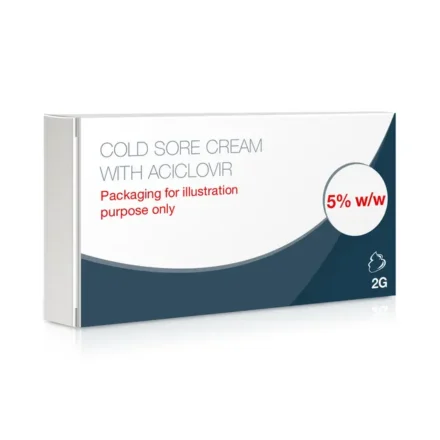- Your cart is empty
- Continue Shopping
NHS Shingles: Symptoms, Vaccine & Pharmacy First Care

Shingles is also known as Herpes Zoster. It’s a painful skin disorder caused by a reactivation of the varicella-zoster Virus, the same virus which causes chickenpox. In the UK, shingles can be a serious problem, especially for adults older than 50 or with compromised immune systems. Patients can now receive advice and treatment from their local pharmacy for shingles through the NHS Pharmacy First Service.
This guide will explain what shingles is and its symptoms. We’ll also discuss the Pharmacy First program, which helps patients. We will also cover key medications like Aciclovir, and over-the counter pain relievers such as Paracetamol or NSAIDs.
What are NHS Shingles?
NHS shingles is the term used to describe the clinical management of the shingles condition in the UK healthcare system. The varicella-zoster reactivates in the nervous system when it lies dormant after an earlier chickenpox.
Key symptoms of shingles include:
- A painful rash that usually affects one side of the skin
- Fluid-filled blisters crust over within 7-10 days
- Before the rash appears, you may experience burning, tingling or shooting pain.
- Touch Sensitivity
- Some cases of fever, headache or fatigue
Shingles does not cause death, but can cause serious discomfort and complications in older adults. Treatment can help reduce the severity and duration of symptoms.
Is Shingles Contagious?
The question that is asked most often is: Is shingles contagious? Answer: The answer to this question is nuanced.
- Shingles cannot be transmitted from one person to another.
- The varicella-zoster can be spread by someone who has active shingles to another person, even if they have never had chickenpox.
- The exposed person will develop chickenpox and not shingles.
NHS advice to reduce transmission:
- Cover the rash
- Do not touch or scratch the blisters
- Hands should be washed regularly
- Avoid close contact with newborns and those with weak immune systems, including pregnant women.
These steps can help patients reduce their risk of virus transmission.
Pharmacy First and NHS Support for Shingles
In the UK, the Pharmacy First service allows patients to seek professional advice on conditions such as shingles without having to make a regular GP appointment. Local pharmacists are able to assess symptoms, make treatment recommendations and provide certain prescription medications.
It is easier to manage shingles this way, since early treatment can reduce the severity of the disease and its duration.
How Pharmacy First Helps with Shingles
- Assessment: Pharmacists are able to review symptoms and eliminate other skin conditions.
- Treatment Guidance: They may recommend antiviral medications and pain relief options.
- Referral: The pharmacist can refer patients to their GP if they have severe symptoms or suspect complications.
This system allows patients to receive prompt treatment while reducing the workload on GP practices and hospitals.
Treatment for Shingles under NHS
Treatment of shingles is aimed at:
- Reduce the severity of the rash and its duration
- Pain relief and discomfort
- Prevent complications like post-herpetic nerve pain
Antiviral Medicines
The most commonly prescribed antiviral for shingles is Aciclovir. This medication helps to slow the progression of the virus and can:
- Reduce the duration symptoms
- Reduce the severity of a rash
- Reduce the risk of long-term pain
Patients are encouraged to seek treatment as soon as symptoms appear.
Pain Relief for Shingles
The pain can be moderate to severe and may continue even after the rash has healed. Patients can take common pain relievers to manage their discomfort:
- Paracetamol is effective in reducing mild pain and fever
- NSAIDs, such as ibuprofen, are useful for inflammation and pain relief.
Depending on the severity of the pain, the NHS might also prescribe stronger painkillers, nerve pain medications, or both.
Shingles Vaccine NHS
The NHS shingles vaccination programme is vital in preventing the shingles virus and its complications. The vaccine boosts immunity against varicella-zoster, reducing the chance of reactivation.
Who is eligible for the shingles vaccine?
NHS guidance
- The vaccine is routinely given to adults aged 70-79.
- The NHS will gradually expand eligibility for younger age groups, starting in September 2023.
- People with weak immune systems can also qualify sooner.
The vaccine reduces not only the chance of developing shingles, but also the risk of long-term post-herpetic nerve pain.
Benefits of the Shingles Vaccine
- It reduces the risk of developing shingles
- If shingles occurs symptoms are usually milder
- Protects vulnerable populations from serious complications
- Protection against varicella and zoster for a long time
The best way to reduce the risk of shingles is by getting vaccinated.
Complications of Shingles
Untreated shingles can lead to more serious complications. Possible complications include:
- Post-Herpetic Neuralgia: persistent nerve pain that persists for months or even years after the rash has disappeared
- Eye loss can occur if shingles occur around the eyes.
- If blisters aren’t properly cared for, skin infections can develop from open sores.
- Neurological problems: such as inflammation of the brain or facial paralysis.
In order to prevent these complications, it is important to use antivirals such as Aciclovir orally and to vaccinate at the right time.
Preventing Shingles and Protecting Others
Other lifestyle changes can reduce the risk, even if the vaccine is the best way to prevent outbreaks.
General prevention tips:
- Healthy immune system can be maintained with a good diet and regular physical activity
- Stress management and sleep: Get enough sleep
- If you have active Shingles, avoid close contact with those who are susceptible to infection (pregnant or nursing women, infants, and immunocompromised people).
- Cover and clean blisters until they heal
Patient Guidance: Living with Shingles
Patients can manage shingles with supportive care at home. While medications like Aciclovir orally and pain relievers such as Paracetamol, NSAIDs, etc. play a major role in the treatment of shingles. Follow the NHS and Pharmacy First guidelines to improve your comfort and speed up recovery.
Self-care tips for shingles patients:
- To reduce the risk of infection, keep the rash dry and clean.
- Avoid irritation by wearing loose clothing
- Calamine or cool compresses can be used to soothe itching and burn.
- Stay hydrated and rest well to help your immune system recover
- Do not scratch the blisters as this may cause scarring or secondary infection
Managing Pain and Discomfort
The most painful part of shingles is the pain. Patients can find relief from:
- Take regular Paracetamol to relieve mild or moderate pain
- Use NSAIDs if swelling and inflammation are present
- Topical cooling gels and patches can provide additional comfort.
- If pain persists even after the rash has healed (possible post-herpetic neuropathy), seek further advice from your doctor.
Most patients will recover quickly if they combine prescribed antiviral medications like Aciclovir orally with over-the counter pain relievers.
When to Seek Urgent NHS Help
If you experience any of the following symptoms, it is important to seek immediate medical attention.
- Rash near the eyes or affecting sight
- Pain that is severe or persistent and does not improve
- The symptoms spread rapidly beyond the area of rash
- Signs of bacterial infections (redness swelling pus)
Early guidance from the NHS can help prevent complications.
Shingles and Daily Life
It can take up to 2-4 weeks for shingles patients to recover. Patients should monitor their energy level and avoid excessive exercise. Even after the rash has cleared, many people still feel tired. Pacing your activities and taking breaks as necessary is important.
The pharmacists are a vital part of the healthcare team, ensuring that patients receive the correct medication and have a pain management plan throughout their recovery.
Bringing It All Together
Patients can receive quick and effective treatment for shingles with the help of NHS Pharmacy First. Aciclovir, an oral antiviral medicine, can be used to relieve pain with Paracetamol and NSAIDs.
The NHS shingles vaccination programme helps to reduce the risk of developing and experiencing shingles, especially in older adults. Combining medical treatment, prevention vaccination, and self care measures, patients are able to manage shingles and prevent infection.
Take the Next Step with VitalMeds
VitalMeds can help if you are experiencing shingles symptoms or need a trusted medication. Our Pharmacy First service offers professional advice, prescription support and access to essential pain relief and medicines such as Aciclovir.
Don’t delay — explore VitalMeds’ range of treatments today and take the first step towards a faster, more comfortable recovery.


